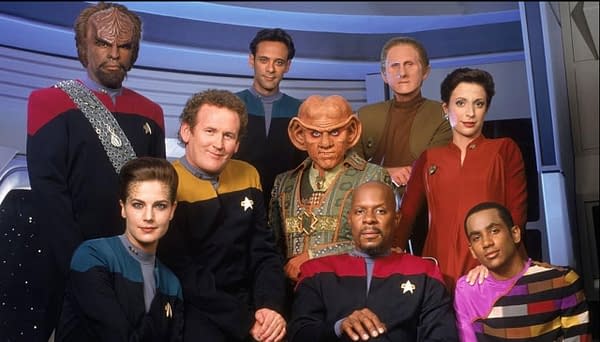Posted in: Netflix, Paramount+, Star Trek, streaming, TV | Tagged: alex kurtzman, netflix, paramount, star trek, Star Trek Picard, star trek: discovery, star trek: prodigy, Star Trek: Starfleet Academy, Star Trek: Strange New Worlds
Could A New Star Trek Series Ever Reach 100 Eps? Kurtzman Responds
Star Trek EP Alex Kurtzman on if it's still possible for a new series to run for 100 episodes like back in the broadcast/syndication days.
There hasn't been any prime-time television franchise that's endured like Star Trek since its humble beginnings on NBC in 1966 with The Original Series. The science fiction trendsetting series only lasted three seasons, but the third was only due to a fan campaign to save the series before its ultimate cancellation in 1969. Since the success of 1977's Star Wars and riding the theatrical success of TOS films, The Next Generation took that next bold step into another uncertain platform: syndication. Its success spawned another spinoff in Deep Space Nine before network television expanded into more networks, and UPN welcomed Voyager and Enterprise. It was the latter's lackluster ratings that caused its cancellation after four seasons, rather than the traditional seven set by TNG, and put the franchise in limbo before the streaming era and Paramount+ gave a third TV life. It's there where traditional 20+episode seasons are at most, cut the number of episodes in half when it's not fewer.

Star Trek EP Alex Kurtzman on If We'll See Newer Shows Reach 100-Episodes
Fans have wondered about the franchise's new home exclusively on streaming with Paramount+'s Discovery, Picard, Lower Decks, Strange New Worlds, and upcoming Starfleet Academy, along with Netflix's Prodigy, if that's ever going to change. Executive producer Alex Kurtzman, who's the gatekeeper of the franchise at Paramount+, spoke to Cinemablend about the new harsh reality we face in a content-starved, more limited-budget world of streaming.
"I don't know, it's very hard. I mean, the fact that [Discovery went to] go on five seasons is sort of a miracle. I think most people watch two seasons of a streaming show, and they check out, you know, and that's not specific to Trek. I just think that's the watch pattern for television in the streaming world. It's hard to know," Kurtzman said. As far as any series reaching the 100-episode landmark, for traditional broadcast television, the typical minimum is to warrant syndicated status for reruns. "My guess would be that it would be unlikely. But in some ways, I think what's lovely about that is– it's funny you can talk to old writers of old Trek series, and they're like, 'Man, there's a bunch of filler episodes in there. We are just trying to get to 22 a season,' you know, and, and we all know which of those episodes were [filler], we know the ones that were truly stellar from the ones that felt like they were kind of spinning their wheels. And so I think what ten episodes a season forces you to do is really make sure that every story counts as much as it possibly can. And I like that, you know, I like that. I like what that affords us now."

As some can ration about filler episodes, they're often a mixed bag because as a 20+episode season becomes tricky, especially when it goes over budget or on the cusp, some result in more enclosed bottle episodes where locations and actors are kept to a minimum. At the same time, you might lose out on potential gems among the stinkers with the expanded opportunities to tell more unconventional stories. If Star Trek isn't returning to broadcast or making any presence on cable TV any time soon, that's not likely to change.

















